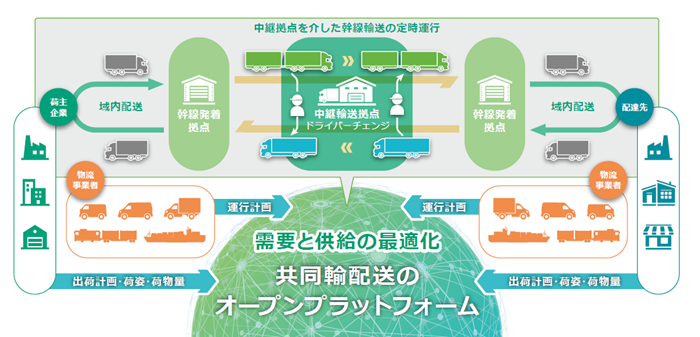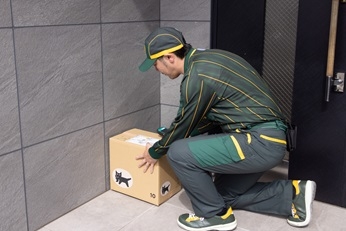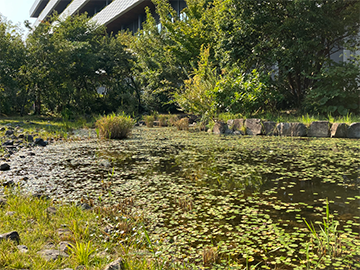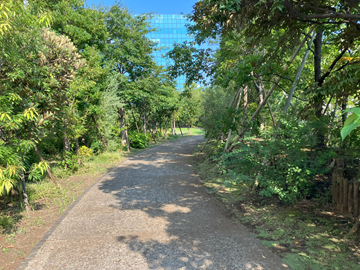Resilience of Companies & Society ~Support a Society That Combats Environmental Changes~
The Yamato Group conducts its business activities throughout Japan, supported by the benefits of nature and biodiversity. At the same time, it is said that the impact of climate change and the loss of biodiversity are becoming increasingly serious. In response to these environmental changes, we recognize the need to further enhance the resilience of our business to fulfill our function as a part of social infrastructure. We are also collaborating with diverse partners to increase the resilience of not only our own group but also its stakeholders and local communities, and to create environmental value. Based on our environmental policy, we are pursuing the ideal form of logistics infrastructure that leads to a society in harmony with the environment.
For details of the Group’s vision and policies, please refer to the document below.Environmental vision (from the Transformation Plan “YAMATO NEXT100” ) [PDF:470KB]
Targets and results
| Materiality | FY2023 Targets | FY2023 Results | |||
|---|---|---|---|---|---|
| Resilience of Companies & Society | |||||
| Support a Society That Combats Environmental Changes | Green logistics in collaboration with our business partners | Started calculating GHG emissions of transportation partners | |||
| Collaborate with society to improve environmental resilience (Test a model and begin distributing information for adapting to climate change) | Started trials for use of cartridge batteries | ||||
| Provide environmentally friendly products and services*13 | Developed system for calculating GHG emissions | ||||
| Collaborate with Society to Improve Environmental Resilience | Reinforce resilient logistics to support mitigation and adaptation measures | Disseminated information and continued to revise manual through response to actual disasters (torrential rain, typhoons, earthquakes) and drills | |||
| Engage in environmental communication | Reinforce information distribution through enhanced disclosure and holding information sessions. Hold dialogues with investors and relay the content within the company | Conducted sustainability (environment and society) briefings Conducted ESG dialogues with institutional investors (major shareholders) |
|||
| Enhance information disclosure according to recommendations of the Task Force on Climate-related Financial Disclosure (TCFD) | Conducted financial analysis of physical risks for Yamato Transport in fiscal 2021 | ||||
| Enhance risk communication | Conducted check of environmental laws and regulation observation status in Compliance and Risk Committee | ||||
| Establish ourselves as an environmentally friendly company. Create an atmosphere where environmental initiatives can be used to encourage sales/communication |
Disseminated information on environmental initiatives via TV commercials, social media, and company newsletters | ||||
| Green Logistics in Collaboration with Our Business Partners | Work with our transportation partners to understand their greenhouse gas emissions, accumulate data, and implement a system to support improvement | Started calculating GHG emissions of transportation partners | |||
| Compliance with environment-related laws and management: Provide environmental certification for partner companies and suppliers, and support improvement | Conducted monitoring (face-to-face) of 40 transportation partners | ||||
- Please use the scroll bar to see the rest of the table.
*13 Products and services with environmental value and a low burden on the environment.






For more targets, please refer to the Sustainable Strategies, Goals, and Results.
Green logistics in collaboration with our business partners
Collaboration with external organizations
Development of Energy Management Centered Around Cartridge Batteries
In promoting each measure aimed at reducing GHG emissions, creating balance between EV operation and charging is an issue in the logistics industry. Since EV operation and charging both occur during daylight hours, it is vital to create a mechanism for balance between operation and charging. Additionally, there are concerns over issues including supply shortages due to a sudden increase in demand for electricity generated via renewable energy sources and insufficient capacity in the necessary systematic power transmission. As a countermeasure, Yamato Transport and Commercial Japan Partnership Technologies Corporation (CJPT) are progressing with studies to standardize and commercialize removable and portable cartridge batteries with the aim of developing energy management centered around cartridge batteries. Furthermore, we aim for the early establishment of EV operation methods, such as development and demonstration of energy systems in Gunma Prefecture, which is a project subsidized by the New Energy and Industrial Technology Development Organization (NEDO), a national research and development agency in Japan.
For details on demonstrations, please refer to Examples of Initiatives for Mitigating Climate Change.

Super Full Trailer 25
In order to realize efficient trunk transportation between major cities, we engage in joint trunk transportation with other logistics companies using the "Super Full Trailer 25" (SF25, a detachable trailer with a length of 25m). Since this initiative was certified by the Ministry of Land, Infrastructure, Transport and Tourism (MLIT) under the revised Logistics Comprehensive Efficiency Act in 2019, we have utilized the subsidy scheme for improving efficiency.
Joint transportation using the SF25 was achieved in cooperation with the Tokyo route truck conference association (Japanese only) and its member companies. The Association aims to achieve logistics that enable harmonious coexistence of the diverse interests of society, including the global environment, and improve daily life; and is working to reduce GHG emissions through transportation. Yamato Transport Co., Ltd. supports these objectives, and participates in green logistics and other initiatives as a member. In operating the SF25, we joined other members in supporting the relaxation of the Special Vehicle Traffic Permit Standard (relaxing the restriction on vehicle length from 21m to 25m), and participated in the demonstrative driving experiment to this end. Subsequently, in FY 2018, MLIT revised the Special Vehicle Traffic Permit Standard, enabling us to commence joint transportation using the SF25. The SF25 can carry the same load as two heavy trucks in a single unit, which is expected to offer higher transportation efficiency and reduce GHG emissions.

An Open Platform for Joint Transportation and Delivery
In May 2024, the Yamato Group established a new company, Sustainable Shared Transport Inc. (hereinafter "SST"), which provides an open platform for joint transportation and delivery. It is available for participation by diverse stakeholders, including shippers and logistics companies, with the aim of streamlining logistics through joint transportation activities between companies. SST's open platform for joint transportation enables logistics matching to suit supply and demand by linking information from shipping companies (e.g. shipment planning, packing style, cargo volume) with information from logistics companies (e.g. route planning), among others. SST's platform enables joint transportation, consolidating multiple logistics networks in a single region, as well as provision of stable transportation and delivery services with high loading ratios.

Supplier and Partner Engagement
As a logistics business, Yamato Transport Co., Ltd. cooperates with suppliers and partners in the use of low-carbon technology in transportation, low-carbon technology demonstration experiments, and other measures (for details, please refer to Introduction of low-carbon technologies and enhancement of operational efficiency). We are making improvements in our identification of the GHG emissions from subcontracted parts of transportation in cooperation with our partners. In fiscal 2021, we added a function for entering data necessary for calculating GHG emissions to the app to enable the sharing of information, and we are beginning to track emissions. To form a shared understanding of what the Yamato Group’s ideal supply chain is, we have formulated the Yamato Group Business Partner Guidelines. We plan to promote communication with major suppliers (for details, please refer to Supply Chain Management).
Collaborate with society to improve environmental resilience
Adapting to climate change
Yamato Transport Co., Ltd. has prepared Guidance on Natural Disasters as the severity of natural disasters (typhoons, heavy rains, heavy snowfall, etc.) has been increasing. We are strengthening countermeasures to enhance resilience. We have a code of conduct to guide behavior in different weather conditions and periods of time leading up to the occurrence of a natural disaster. Under the code of conduct, we inform customers of any impact on services and provide safety and detour information to employees and partners. If there are concerns that a natural disaster will seriously impact an area, we will set up disaster response headquarters headed by the president. Relevant departments will cooperate with each other to share the information necessary for the restoration of services and the provision of support and promptly take action to ensure business continuity. Following the restoration of services, we cooperate with local governments and others to transport relief supplies and support disaster-stricken areas. We continually assess flood risk and regularly conduct disaster drills at business sites nationwide. We are improving our skills every year to flexibly and promptly acting to prevent packages, vehicles, and equipment from being affected by disasters and ensuring business continuity using transportable routes to deliver goods according to the situation.
To tackle rising temperatures, we are taking adaptation measures, for instance with initiatives that include the introduction of coolers suitable for work at hub base and sales offices and the adoption of employee uniforms made of sweat-absorbent, quick-drying fabric. Going forward, with these initiatives, we will further aim to be a resilient logistics company which is part of the social infrastructure .

Provide environmentally friendly products and services
The Yamato Group is expanding its range of products and services that have a low environmental impact and offer environmental value.
Since customers have diverse needs related to receiving parcels, Yamato Transport Co., Ltd. has made it more convenient for them.
As a method of selecting how to receive a parcel, we offer the Kuroneko Members individual member service. If an individual is registered as a member, they are able to specify a delivery date, a time slot, and a destination.
Furthermore, to expand options for receiving locations, we are improving the infrastructure for PUDO Stations, which are open-type courier delivery lockers that can be used to send and receive packages. In 2020, we started to provide EAZY, a delivery service for e-commerce that enables the user to receive packages without face-to-face interactions. For example, the user can ask us to leave packages in front of their entrance door. In 2022, we started rolling out a multi-digital key platform service that enabled us to provide Okihai, an unattended delivery service, to EAZY customers living in condominiums that have automatic locks. From June 2024, we have newly added Okihai as a method for receiving TA-Q-BIN and TA-Q-BIN COMPACT deliveries for our Kuroneko Members.


In order to contribute to the sound growth of the small-lot refrigerated delivery market, we have promoted the development of international standards for these services in coordination with the British Standards Institution (BSI). As a result of these efforts, the BSI published the PAS 1018: 2017 standard in 2017. Looking ahead, we will continue working to create a sound market and expand opportunities for the provision of these services.
We are advancing development of services aimed at visualizing the GHG emissions of corporate clients. We are currently developing a GHG emissions visualization tool based on ISO 1403:2023*1, an international standard for calculating GHG emissions generated during transport published on March 20, 2023. This standard calculates GHG emissions from not only trucks but various methods of transportation, such as air and marine, and terminals. We are developing a visualization tool that can be utilized on a global scale and enables calculation of GHG emissions from the transportation of Yamato Transport that fall under Scope 3*2 for our corporate clients in a more realistic manner.
*1 Standard for calculation of GHG emissions generated during transport, covering all logistics companies (road, rail, air, marine, water, etc.)
*2 Indirect GHG emissions generated by companies in the supply
Yamato Autoworks Co., Ltd. provides services that contribute to increasing the use of low-carbon vehicles, including the maintenance of EVs and the installation and management of charging facilities. To provide services, 832 employees who have completed a low-voltage electricity technician training course and an EV maintenance special training course are internally registered as experts (as of September 2024). Yamato Autoworks will continue to provide service, taking advantage of its track record in maintenance for electric trucks and buses, and it will play a leading role in initiatives for low carbonization in the logistics industry.



Environmental communication
The Yamato Group values environmental communication with stakeholders and local communities, and strives to expand and enhance information disclosure and engage in two-way communication, such as dialogues with investors.
Dissemination of Information to Society and Education
The Yamato Group disseminates information about its environmental initiatives through channels such as news releases, company commercials, videos, handbooks, and social media. In addition, to increase employee awareness of environment issues and achieve adequate environmental management, we continually provide environmental education and raise recognition using company newsletters. With regard to training on environmental management systems, we provide education to Yamato Transport officers, department managers at the headquarters, operational managers nationwide, and employees responsible for management of environmental issues. They use what they have learned in their day-to-day management of operations. We also provide internal auditor training, environmental compliance training, and sustainability basic training to deepen employees’ understanding of environmental initiatives. In fiscal 2023, approximately 730 officers and employees received environmental education. For more information on communication with stakeholders, please refer to the Stakeholder Engagement section.
Environmental communication with communities
Yamato Transport Co., Ltd.has been holding Kuroneko Yamato Environmental Classes since October 2005 to support the environmental education of children, the leaders of the next generation. We renewed the Kuroneko Yamato Environmental Classes from 2023 to spur children into thinking about what they can do for the environment. We aim to achieve this by teaching them how their small, individual activities lead to further environmentally-friendly actions and protecting the global environment.
- Approx. 3,397 classes held up until fiscal 2023
- Approx. 257,239 participants up until fiscal 2023 (cumulative total)
* From fiscal 2020, classes have not been held given the state of the COVID-19 pandemic


Biodiversity conservation
The Yamato Group is working to conserve local biodiversity, in order to coexist in harmony with the natural environment that supports our affluent society
Case Study 1 : Restoration of habitats for wildlife
The Haneda Chronogate logistics terminal has a facility named Wa no Sato (loosely translatable as "Village of Harmony") that aims to achieve harmonious coexistence with the natural environment. The area features trees planted to match the local ecosystem and biotopes utilizing natural stone materials.



| FY2019 | FY2020 | FY2021 | FY2022 | FY2023 |
|---|---|---|---|---|
| 2,800 | 2,800 | 2,800 | 2,800 | 2,800 |
- Boundary: Consolidated Group companies in Japan, and Swan Co., Ltd.
Case Study 2: Marine conservation activities
Death of coral due to rising sea temperatures has become a problem in recent years. Okinawa Yamato Transport Co., Ltd. participates in Team Tyura Sango, a coral conservation activity conducted by local governments, local residents, and companies. As a member of the team, Okinawa Yamato Transport Co., Ltd. supports coral seedling cultivation, planting, and awareness-raising activities.
Furthermore, we engage in increasing employee environmental awareness and conducting marine conservation activities in beautiful Okinawa by carrying out community cleaning activities, such as beach cleaning, in various locations within the prefecture.


Sustainable Finance
We issued our first green bonds as Yamato Holdings in July 2023 as a method of procuring funds to actively promote environmentally-friendly initiatives.
We formulated the Yamato Holdings Green Finance Framework in line with four pillars (1. use of procured funds, 2. project evaluation and selection process, 3. management of funds, and 4. reporting) established under the Green Bond Principles (GBP) 2021 set out by the International Capital Market Association (ICMA), the Green Bond Guidelines set out by the Japanese Ministry of the Environment (published in 2022), and other policies. Proceeds from these bonds are allocated to measures such as EVs and solar power generation equipment at each base and business site.
